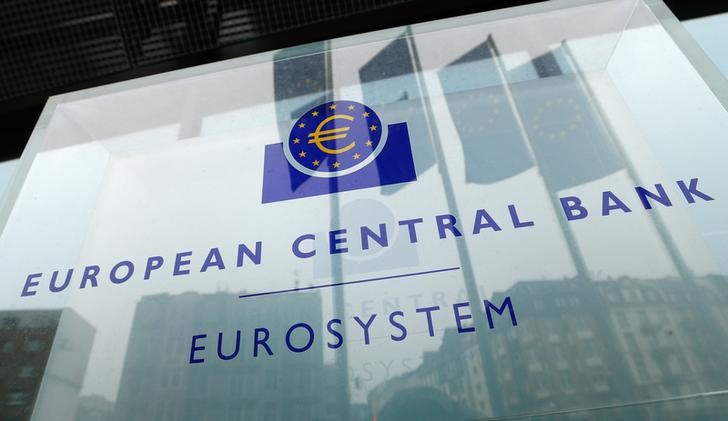By Francesco Canepa and Balazs Koranyi
FRANKFURT (Reuters) - Five large euro zone banks face a cap on how much they can pay in dividends, bonuses and coupons next year because they have too little capital, the European Central Bank said on Thursday, a worrying sign for a sector struggling with meagre profits and unpaid loans.
The ECB did not name the five banks, part of the roughly 130 it has supervised since becoming the bloc's watchdog in 2014 with the aim of preventing a repeat of the 2008-12 banking crisis.
The ability to make payouts to share- and bondholders is crucial for banks because it affects their ability to raise cash from investors. For example, worries about coupon payments have pummelled Deutsche Bank's (DE:DBKGn) shares and bonds over the past year.
The ECB's annual review comes as lenders in Italy and other crisis-struck countries are under pressure to raise capital to cover losses from bad loans. Troubled Monte Paschi (MI:BMPS) may need state help after failing to attract enough investors.
"Capital adequacy (is) still negatively affected by non-performing loans in some countries - weighing on banks' profitability," the ECB said in a booklet.
Bad debt inherited from the financial crisis are tying up capital and curbing fresh lending in countries such as Italy, Greece and Portugal.
The ECB is trying to get banks in those countries to work off their bad loans, but that often means raising capital to absorb the resulting losses.
Italy's UniCredit (MI:CRDI) began a 13 billion-euro (10.90 billion pounds) capital increase earlier this week, largely aimed at cushioning the sale of soured credit.
Monte Paschi has so far failed to raise the 5 billion euros agreed with the ECB and is likely to need help from the Italian state by the end of the year.
More banks may also need to tap the market for capital in the coming months.
"There is a probability that there could be more capital raisings to ensure that NPLs are dealt with," said Tom McAleese, head of bank restructuring in Europe at consultancy firm Alvarez & Marsal. "But the cleaning of the banks is probably necessary in some cases."
Unpaid credit will remain an ECB priority for next year, along with specific types of bank assets such as shipping loans, a $100 billion business for German banks.
The ECB will also look at what consequences Britain's decision to leave the European Union will have on its own supervisory work. Some London-based lenders may expand their euro zone operations to retain a foothold in the euro zone.
FIVE BANKS MISS LOWERED BAR
Even after the ECB lowered its capital requirements from the previous year, the number of banks falling short remained unchanged at five.
The ECB demanded that, on average, banks hold Core Equity Tier 1 capital, a key measure of their own funds, equal to 8.3 percent of their risky assets if they are to pay out to staff and investors. That is down from 10.2 percent a year ago.
Banks falling below that face a cap on their payouts expressed as a proportion of any profit they make.
The drop in requirements comes after a change in the rules. The ECB now expresses parts of its capital demands as voluntary 'guidance', breaching which does not affect payouts.
Once such capital guidance is factored in, the ECB's demands were stable year on year at 10.1 percent.
This two-tier design was introduced by the European Commission after a market selloff earlier this year to shield holders of convertible bonds from the risk of missing payments.
However, the ECB has told banks on its watch they need to ensure they comply with guidance when deciding on dividend and remuneration payments, a letter showed on Thursday.
Once such capital guidance is factored in, the ECB's demands were stable year on year at 10.1 percent.

($1 = 0.9602 euros)